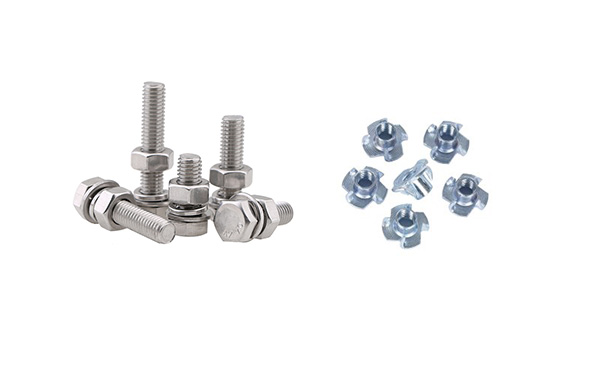T-Nuts Vs. Regular Nuts And Bolts
T-Nuts and regular nuts and bolts serve similar functions in that they both enable the joining of two or more components. However, they have distinct differences in terms of design, installation, and use cases. As a professional fastener supplier, Xinchi Fastener Company is glad to compare T-Nuts with regular nuts and bolts for you.

T-Nuts:
Design: T-Nuts consist of a flat, typically round, or rectangular metal plate with prongs on the backside. These prongs grip the material when the T-Nut is inserted and prevent it from rotating.
Installation: T-Nuts require a pre-drilled hole or slot to be created in the material where they will be inserted. Once the hole is prepared, the T-Nut is inserted from one side of the material, and the prongs grip the material on the opposite side.
Advantages:
Provide a threaded hole in materials like wood or thin sheet metal that might not hold threads well on their own.
Evenly distribute load and reduce the risk of damaging the material.
Flush appearance on the surface when installed.
Disadvantages:
Require a pre-drilled hole or slot, adding an extra step to the installation process.
May not provide as much clamping force as bolts in high-torque applications.
Regular Nuts and Bolts:
Design: Regular nuts and bolts consist of a threaded bolt (screw) and a corresponding nut with internal threads. The nut is threaded onto the bolt to secure the joint.
Installation: A hole is typically drilled through both materials to be joined. The bolt is passed through the hole, and the nut is threaded onto the bolt to tighten the components together.
Advantages:
Provide a strong and reliable connection, especially in high-torque applications.
Versatile and can be used in a wide range of materials and applications.
Can be easily adjusted or replaced.
Disadvantages:
The nut may need to be accessed from both sides of the material being joined, which can be challenging in certain situations.
Can protrude from the surface, which might not be desirable in some cases.
Comparison Between T-Nuts and Regular Nuts And Bolts:
Load Capacity: Regular nuts and bolts generally provide higher load-bearing capacity and torque resistance compared to T-Nuts. They are often used in applications where substantial clamping force is required.
Installation Complexity: T-Nuts require pre-drilled holes or slots, which can be time-consuming. Regular nuts and bolts also need holes, but the installation process is more straightforward.
Applications: T-Nuts are ideal for situations where a threaded hole is needed in materials that are not naturally threaded, while regular nuts and bolts are suitable for a wide range of applications, from woodworking to metalworking and machinery assembly.
Access: T-Nuts can be installed in materials where access from one side is possible, while regular nuts and bolts might require access from both sides of the joint.
Appearance: T-Nuts provide a flush appearance on the surface, while regular nuts and bolts can protrude and might not offer a seamless finish.
In summary, the choice between T-Nuts and regular nuts and bolts depends on the specific requirements of the project, including load capacity, material type, ease of installation, and desired aesthetics. While T-Nuts are advantageous for providing threaded holes in materials with limited threading capabilities, regular nuts and bolts offer greater load-bearing capacity and versatility in a wide range of applications.
Xinchi Fastener Company is a trustworthy fastener company, especially in furniture nuts. And we are the designated fastener supplier to“STAPLE”. As a trusted fastener supplier, Xinchi Fastener Company can offer a wide range of high-quality fasteners, including T nuts, screws, bolts, rivets, washers, etc. If you want to know more about fasteners or want to wholesale fasteners, please feel free to contact us. And then our experienced and expert service team will reply to you as soon as possible.

